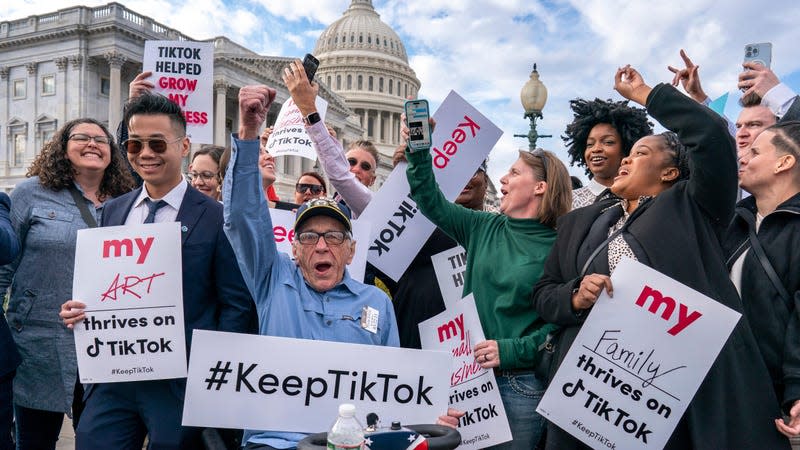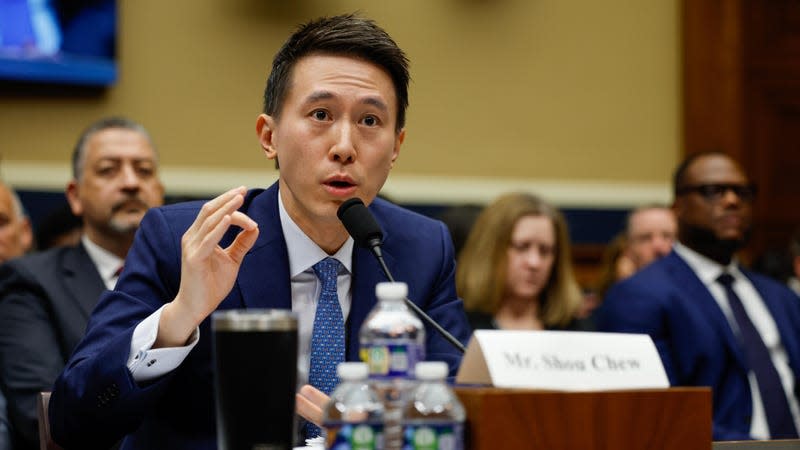Why TikTok Needed to Pay for Influencers to Attend Anti-Ban Rally

A fiery coalition of more than two dozen TikTok content creators gathered outside the steps of the nation’s capitol Wednesday to fiercely oppose growing lawmaker calls for a nationwide ban. Every one of those protesters had their expenses covered by TikTok.
The spokesperson for the social media firm confirmed that it paid for the creators’ travel expenses in a statement sent to Gizmodo. Those payments, according to a Wired report, covered the hotel, travel, meal, and shuttle rides for the creators, some of whom traveled across the country to attend the rally. Roughly 30 TikTok influencers attended the protest and each of them was reportedly allowed to bring their own plus one. Around a dozen of the influencers in attendance told Wired they weren’t paid to attend the event per se, but nearly all of those accounted for accepted the company’s offer to pay for a hotel room. The critical rally took place on the eve of a highly anticipated House Energy and Commerce Committee hearing where lawmakers from both sides of the political aisle grilled TikTok CEO Shou Zi Chew for nearly five hours. The overwhelming consensus of that hearing: Lawmakers, regardless of political affiliation, appear committed to banning TikTok or pressuring a forced sale of the company.
Read more
These Winning Close-Up Photos Show Life That's Often Overlooked
Remembering Enterprise: The Test Shuttle That Never Flew to Space
“Any barriers to getting here they [TikTok]] helped cover,” Tiffany Yu, an L.A.-based influencer and one of the speakers at the rally said. TikTok did not respond to Gizmodo’s request for comment asking for the total amount spent on the creators.
Here’s a full shot of the crowd of TikTok creators. pic.twitter.com/9NBBNeL6mC
— Kalhan (@KalhanR) March 22, 2023
Influencers gave a human face to TikTok’s 150 million US users
Creators speaking to a crowd of more than 140 people at the rally praised the app for providing them a platform to express themselves, build communities, and in some cases, expand the reach of their business. Combined, the influencers in attendance reportedly have around 60 million followers. Many held signs reading “Keep TikTok.”
“I want to stop the misconception that it’s just an app. It’s so much more than that,” TikTok creator Duncan Joseph said according to NBC News. “If it were to be removed, these communities can’t just go to another spot. This is the home…and you just can’t rip that social fabric away from so many people.”
The rally occurred just one day after CEO Chew posted his own TikTok where he claimed the app had more than 150 million monthly US users, a 50% increase from the 100 million users reported just two years earlier. Chew referenced that figure repeatedly during his Congressional testimony, where he tried to convince antagonist lawmakers of the app’s crucial importance for a wide swath of Americans. The protestors paid to travel to D.C. gave those numbers a human face.
“More than 150 million Americans, including 5 million U.S. businesses, rely on TikTok to innovate, find community, and support their livelihoods,” a TikTok spokesperson told Gizmodo. “A U.S. ban on TikTok could have a direct impact on the livelihoods of millions of Americans. Lawmakers in Washington debating TikTok should hear firsthand from people whose lives would be directly affected by their decisions. “
TikTok Supporters say a ban could crush free expression online
The protestors were joined by several US lawmakers, most notably Democratic New York Rep Jamaal Bowman, who’s emerged as one of TikTok’s most vocal supporters in recent months. Speaking before an audience at the rally Wednesday, Bowman rejected his fellow lawmakers’ categorization of the Chinese-owned app as a national security risk and said the company “poses about the same risk as Facebook and Instagram and YouTube and Twitter.” In the past, Bowman has said he feared lawmakers were singling out TikTok due to “xenophobic anti-China rhetoric.”
Bowman, who himself has a TikTok account with around 163,000 followers, told The New York Times this week he has never taken a meeting with a TikTok employee. However, one of his aides admitted TikTok did, in fact, help orchestrate a meeting between the lawmaker and the influencer protestors. The lawmaker did not immediately respond to Gizmodo’s request for comment.
“My question is: Why the hysteria and the panic and the targeting of TikTok?” Bowman said during the rally. “As we know, Republicans, in particular, have been sounding the alarm, creating a red scare around China.”
TikTok may have a short supply of friendly politicians in D.C. but the same can’t be said for advocacy groups. On Thursday, 16 prominent organizations including the ACLU and the Knight First Amendment Institute at Columbia University, sent an open letter to members of Congress opposing a national TikTok ban…The groups said such a ban would have, “serious ramifications for free expression in the digital sphere,” and raise First Amendment questions.
“For citizens, and particularly the tens of millions of young Americans who use TikTok, to witness a popular social media platform summarily shut down by the government will raise serious questions in the minds of a rising generation about the sanctity of free speech in our system of governance,” the organizations wrote.

The House Energy and Commerce Committee hearing was an abject win for Congress, but not necessarily because they made any particularly compelling arguments. TikTok’s complicated Chinese ownership made its CEO an easy target. Lawmakers relentlessly attacked the TikTok CEO, with some choosing to focus on horrific, but rare cases of deaths resulting from TikTok trends and others questioning the company’s Chinese ownership. On the latter issue, there was simply no answer that could properly satisfy lawmakers. House members rejected the TikTok plan, dubbed “Project Texas,” to route US user data through an American company, as insufficient, and questioned Chew’s honesty. After nearly five hours of questioning, Chew, who had impressively maintained his cool to that point, finally expressed some exasperation, telling lawmakers they were essentially asking him to do the impossible and prove a negative in regards to hypothetical Chinese government surveillance on TikTok.
Recent polling suggests that average US internet users share similar concerns about TikTok’s China connection, though the degree of concern depends a lot on age and whether or not they actually use the app. A recent poll conducted by SocialSphere found nearly half (49%) of millennial voters aged between 27-42 said they support a national TikTok ban. That figure dipped down to just 34% for Gen Z voters. 71% of the Gen Z voter said they had an active TikTok account, compared to just 43% of the millennials.
TikTok: outgunned and out-funded in Washington
TikTok and its parent company ByteDance aren’t strangers to the D.C. influence circuit. Last year, according to Open Secrets, ByteDance spent $5.3 million on lobbying, nearly 20 times the $270,000 it spent in 2019. That sounds like a lot (and it is) but it pales in comparison to the combined amount of lobbying spent by US tech firms last year, some of which would directly benefit from a TikTok ban. Last year, Bloomberg estimates Meta, Amazon, Alphabet, and Apple collectively spent $70 million with Amazon alone spending nearly $20 million. Aside from their deep money bags, those US companies have also been around the block long enough to form deeply forged relationships with lawmakers in D.C. they can lean on for support. US telecoms like AT&T have been building those types of political relationships for even longer. That entrenched power is partly how they managed to all of a sudden kill historic bipartisan antitrust reform bills last year that seemed all but certain to pass months earlier.
TikTok, by contrast, isn’t so fortunate. Aside from Bowman, few if any lawmakers in 2023 want to be seen as sticking their necks out for a company, justifiably or not, associated with the Chinese government. With polls showing public opinion gradually shifting against TikTok, appearing tough on it is increasingly an easy win for lawmakers. So with US tech firms and other industry heavyweights outspending them and no real big political figures willing to take on their cause, is it really so shocking TikTok would lean on its creators to spread its political messaging? An outright TikTok ban, not long ago considered a Trump-era fever dream, looks like it’s closer to reality than ever before. TikTok finds itself in a fight for survival, and it needs all the help it can get.
More from Gizmodo
Sign up for Gizmodo's Newsletter. For the latest news, Facebook, Twitter and Instagram.

